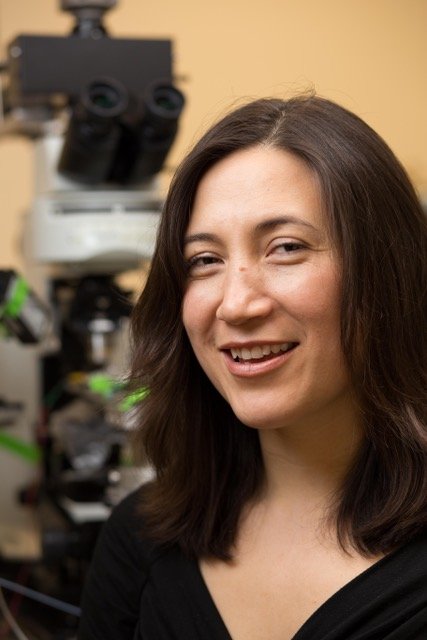Dr. Yasmin Escobedo Lozoya
Postdoctoral Fellow Harvard University
Ph.D. in Neuroscience Brandeis University
Photo credit: Rev. Mark Santucci
Throughout her experiences navigating the academic system, Dr. Yasmin Escobedo Lozoya has reflected extensively on the collaborative nature of human intellectual pursuit: how do people come together to pursue a common goal, and how are those goals identified and delegated? At the same time, Yasmin, now a postdoctoral fellow, is also asking similar questions - how connections are made and communication happens - in the brain.
As an undergraduate at the National Autonomous University of Mexico, Yasmin began with a much broader set of questions: why are people curious, and how do they learn? She hoped to bridge the gap between these more philosophical questions and her love for biology in a neuroscience research lab. She found the opportunity in a unique program that allowed her to rotate in research labs as an undergraduate. Yasmin explored labs visualizing the dynamics at neuronal connections and tried her hand at electrophysiology. For the first time, she saw how biophysical properties of a neuron were modulated by external signals, and she began to wonder how this information was integrated and stored in memories.
Searching for answers, Yasmin began the process of picking and applying to PhD programs. She met a professor at a small conference in Mexico who noted her enthusiasm for neuroscience during a poster presentation. He suggested she apply to Duke, where he was a PI. Several months later, she joined his lab – as a new graduate student. Unfortunately, the reality of pursuing a PhD in the United States was different than she had expected, and she experienced culture shock. She found those around her had different priorities than her own – they seemed less focused on the discovery-driven aspects of science and more focused on getting their papers into the right journals. Describing a constant feeling akin to the nervous speechlessness one experiences right before an important presentation, Yasmin recounted feeling voiceless and isolated, with no way to express the culture shock she was experiencing.
Realizing the disconnect between the research culture she expected to find in a graduate program in the US and her experiences in this PhD program, she let herself drift off graduate school as she internally sought to reconcile her feelings and to find an environment that better fit her notion of collaborative, discovery-driven science. She applied for a technician position in Dr. Ryohei Yasuda’s lab. Dr. Yasuda’s lab was studying the biophysical mechanisms of memory storage, the topic she had been so enthusiastic about when originally applying to PhD programs. Excited by the prospect of studying the questions she had been curious about for so long, she applied and was offered an interview. However, the ending of the interview was unclear; she wasn’t sure if she had gotten the job. She decided to come back the next day and start working, and Dr. Yasuda didn’t stop her. She was hired! This smaller lab, combined with the collaborative environment Dr. Yasuda curated, felt much closer to the ideal she had imagined for what a career in research would be. Team building and a focus on the pursuit of a common goal were ingrained as founding principles of the lab. Yasmin hopes to bring this philosophy to her own lab; she plans to prioritize building an environment which fosters collaboration and interpersonal connection in every aspect, down to how things are organized on the shelves.
Newly invigorated, and with a model of what she was looking for in a research environment, Yasmin reapplied to PhD programs. She found a match in Brandeis’ Neuroscience Program; the smaller university environment and supportive graduate program appealed to her. She joined Dr. Sacha Nelson’s lab and switched to studying network dynamics in development. Her thesis focused on how neurons use plasticity mechanisms to adapt to and then store information about differences in activity levels from inputs. She addressed this question by observing what happens when the process goes wrong; if cells aren’t exposed to the typical activity patterns of their connecting neurons during development, and thus cannot adapt properly, how does this affect network function? To answer this question, Yasmin blocked activity in a cortical slice culture model and looked at changes in cell morphology and electrical activity. She found that, in response to activity deprivation, cells took almost every available measure to increase their excitability. This caused an overcompensation later on, destabilizing the network and causing epileptic activity.
For her postdoctoral work in Dr. Susan Dymecki’s lab at Harvard Medical School, Yasmin studies a similar question. However, she now focuses on how different brain networks communicate effectively through modulation of their respective “volumes,” or how heavily their input is weighted in connecting brain regions. Specifically, she looks at neurons that express the genes associated with making serotonin, a neuromodulatory cell-type in the brain that she hypothesizes can act as a switch, turning up and down input from certain neurons and networks.. She studies a unique subset of neurons in this serotonergic family that project to the hippocampus and are important for creating reward memories in mice. Yasmin hypothesizes that these cells determine the weighting of inputs for the encoding of reward memories, gating whether or not a memory trace is formed for a given event.
She hopes to continue studying how different parts of the brain communicate with each other in her own lab. However, even as she studies intra-brain communication, she also has her eye on inter-brain communication in the future Escobedo lab. Throughout this interview, Yasmin’s commitment to fostering a welcoming and playful environment are on full display. Her thoughtfulness and dedication in this regard will help bridge the gap between the realities of academia in the US and the ideal Yasmin had imagined, ensuring that young scientists feel at home in the academic community.
Listen to Nancy’s full interview with Yasmin on December 28, 2021 below!



